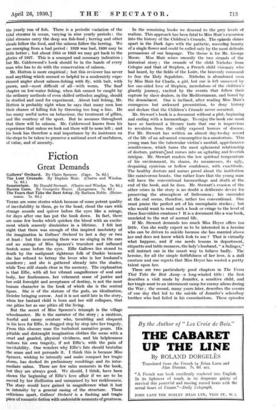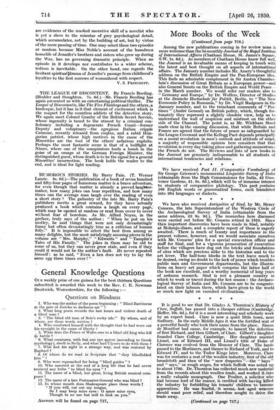Fiction
Great Demands
Gallows' Orchard By Claire Spencer. (Cape. 7s. 6d.)
mann. 7s. 6d.) ,
THERE are some stories which because of some potent quality of inevitability in them, go to the head, cloud the ears with strange sounds and quiver before the eyes like a mirage, for days after one has put the book down. In fact; there are some few books which quicken the blood with an excite- ment which scarcely diminishes in a lifetime. I felt last night that there was enough of this inspired insobriety of the imagination in Gallows' Orchard to last a day or two at least : but this morning there was no singing in the ears and no mirage of Miss Spencer's truculent and inflamed Scotch scene before the eyes. Effie Gallows lies stoned to death by the malignant righteous folk of Durkie because she has refused to betray the lover who is her husband's murderer ; and she is gathered already into the shades, while Tess still stands clear in the memory. The explanation is that Effie, with all her vibrant magnificence of soul and body, her fearlessness, her vehement sense of justice and her cold foresight and acceptance of destiny, is not the most human character in the book of which she is the central figure. She is of the stature of the gods, an idealization, Deirdre bringing sorrow. And it is not until late in the story, when her bastard child is born and her will collapses, that one pities her as one pities all the living.
But the secret of Miss. Spencer's triumph is the village schoolmaster. He is the narrator of the story ; a cautious, fearful and canny creature who, trembling and eloquent in his love for Effie, is dragged step by step into her tragedy. From this obscure man the turbulent narrative pours. His pitiable and distraught imagination clothes the scene with a cruel and gnarled, physical vividness, and his helplessness endows his own tragedy, if not Effie's, with the pain of inevitability. One wonders why Effie's fate should brutalize the sense and not persuade it. I think this is because Miss Spencer, wishing to intensify and make compact her tragic storm, has docked its preliminary rumblings and its inter- mediate calms. There are few calm moments in the book, but they are always good. We should, I think, have been shown the beginning of Effie's love affair if we are to be moved by her disillusion and unmanned by her recklessness. The story would have gained in 'magnificence What it lost in intensity by a general easing of the structure. These criticisms apart, Gallows' Orchard is a flashing and tragic piece of romantic fiction with'undeniable moments of greatness. In the remaining books we descend to the grey levels of: realism. This approach has been fatal to Miss Muir's excursion into the history of the Children's Crusade. The episode shines apart in the Dark Ages with the pathetic, wavering beauty of a single flower and could be culled only by the most delicate persuasions of our language. The theme is for Mr. George Moore. Miss Muir seizes uneasily the two strands of the historical story ; the crusade of the child Nicholas from Cologne and that. of Stephen, a French child visionary who had heard, by the fields of the Loire, the heavenly command' to free the Holy Sepulchre. Nicholas is abandoned soon by Miss Muir for. Charla, a girl, but one is left unmoved by her one-sided love of Stephen, incredulous of the children's ghastly journey, excited by the events that follow their capture by slave dealers, in the Mediterranean, and bored by the denouement. One is inclined, after reading Miss Muir's courageous but awkward presentation, to deny history and declare that the Children's Crusade never occurred.
Mr. Stewart's book is a document without a plot, beginning and ending with a haemorrhage. To enjoy the book one must have so hardened a literary taste that one is impervious to revulsion from the coldly exposed horrors of disease. For Mr. Stewart has written an almost day-to-day record of the life of an advanced consumptive in a sanatorium. This young man has the tubercular victim's morbid, apprehensive sensitiveness, which turns the most ephemeral relationship of doctors, patients and nurses into an agitating and feverish intrigue. Mr. Stewart renders the low spiritual temperature of his environment, its shams, its meannesses, its ugly, despairing cynicism or hollow confidence, with exactitude. The healthy doctors and nurses prowl about the institution like carnivorous beasts. One rather fears that the young man will have the conventional haemorrhage and death at the end of the book, and he does. Mr. Stewart's evasion of the other crises in the story is no doubt a deliberate device for preserving the atmosphere of listlessness ; his surrender at the end seems, therefore, rather too conventional. One must praise the perfect art of his unemphatic strokes ; but who would want to read such a book or cringe to the level of these fear-ridden creatures ? It is a document like a war book, unrelated to the rest of normal life.
If Mr. Stewart demands too much Miss Heyer offers too little. Can she really expect us to be interested in a heroine who can be driven to suicide because she has married above her and does not know which fork to use ? That is virtually what happens, and if one needs lessons in 'deportment, etiquette and table manners, the lady's husband, " a Salinger,", will instruct one in the Smart way to behave badly. The heroine, for all the simple faithfulness of her love, is a dull creature and one regrets that Miss Heyer has wasted a pretty talent upon her.
There are two particularly good chapters in The Years That Take the Best Away—a long-winded title : the first describes a visit made by Jennifer, a sensitive child, and her tragic aunt to an internment camp for enemy aliens during the War ; the second, many years later, describes the events of one day that led to the suicide of Jennifer's schoolboy brother who had failed in his examinations. These episodes are evidences of the marked narrative skill of a novelist who is yet a slave to the minutae of grey psychological detail, which accumulates, not by the_building of art, but by virtue of the mere passing of time. One may select these two episodes at random because Miss Noble's account of the humdru:n homelife of Jennifer's brothers and sisters who grew up during the War, has no governing dramatic principle. When no episode in it develops nor contributes to a wider scheme, tedium is inevitable. On the other hand, one regards the hesitant spiritual {drama of Jennifer's passage from childhood's loyalties to the first sorrows of womanhood with respect.
V. S. ParrcnErr.





































 Previous page
Previous page